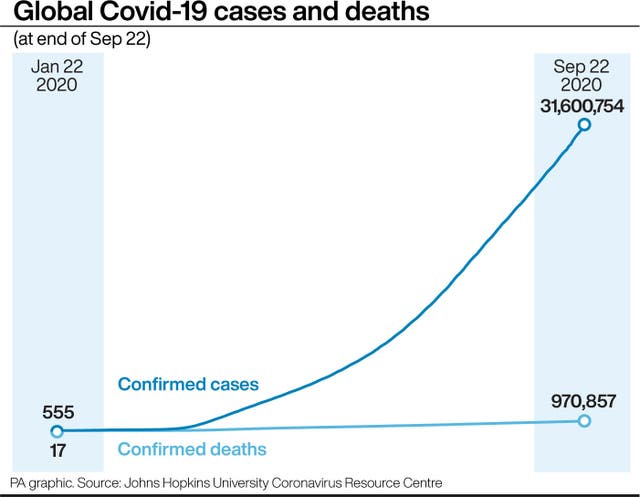The US death toll from the coronavirus topped 200,000 on Tuesday, by far the highest in the world.
“It is completely unfathomable that we’ve reached this point,” said Jennifer Nuzzo, a Johns Hopkins University public health researcher, eight months after the scourge first reached the world’s richest nation.
The number of dead is equivalent to a 9/11 attack every day for 67 days. It is roughly equal to the population of Salt Lake City or Huntsville, Alabama.
And it is still climbing. Deaths are running at close to 770 a day on average, and a widely cited model from the University of Washington predicts the US toll will double to 400,000 by the end of the year as schools and colleges reopen and cold weather sets in.
A vaccine is unlikely to become widely available until 2021.
“The idea of 200,000 deaths is really very sobering, in some respects stunning,” Dr Anthony Fauci, the government’s top infectious-disease expert, said on CNN.
The bleak milestone was reported by Johns Hopkins, based on figures supplied by state health authorities. But the real toll is thought to be much higher, in part because many Covid-19 deaths were probably ascribed to other causes, especially early on, before widespread testing.
Mr Trump said it was “a shame” the US reached that number but argued the toll could have been much worse.
“I think if we didn’t do it properly and do it right, you’d have 2.5 million deaths,” Mr Trump told reporters at the White House before leaving for a campaign rally in Pittsburgh.
He added that the United States is now “doing well” and “the stock market is up”.
He also gave his often-repeated broadside that China was at fault for the pandemic.
In a pre-recorded speech to the UN General Assembly, he demanded that Beijing be held accountable for having “unleashed this plague onto the world”. China’s ambassador rejected the accusations as baseless.

On Twitter, Democratic presidential candidate Joe Biden said, “It didn’t have to be this bad.”
“It’s a staggering number that’s hard to wrap your head around,” he said. “There’s a devastating human toll to this pandemic — and we can’t forget that.”
For five months, America has led the world by far in sheer numbers of confirmed infections — nearly 6.9 million as of Tuesday — and deaths.
The US has less than 5% of the globe’s population but more than 20% of the reported deaths.
Brazil is second with about 137,000 deaths, followed by India with approximately 89,000 and Mexico with around 74,000.
Only 10 countries rank higher in Covid-19 deaths per capita.
Worldwide, the virus has infected more than 31 million people and is closing in fast on 1 million deaths, with nearly 967,000 lives lost, by Johns Hopkins’ count, though the real numbers are believed to be higher because of gaps in testing and reporting.
When the year began, the US had recently garnered recognition for its readiness for a pandemic.
Let me be very clear, @realDonaldTrump: Not a single one of the 200,000 Americans we've lost to this virus was a "nobody." pic.twitter.com/0Inut60nCP
— Joe Biden (@JoeBiden) September 22, 2020
Health officials seemed confident as they converged on Seattle in January to deal with the country’s first known case of the coronavirus, in a 35-year-old Washington state resident who had returned from visiting his family in Wuhan, China.
On February 26, Mr Trump held up pages from the Global Health Security Index, a measure of readiness for health crises, and declared, “The United States is rated No. 1 most prepared.”
But monitoring at airports was loose. Travel bans came too late. Only later did health officials realise the virus could spread before symptoms show up, rendering screening imperfect.
The virus also swept into nursing homes and exploited poor infection controls, claiming more than 78,000 lives.
At the same time, gaps in leadership led to shortages of testing supplies. Internal warnings to ramp up production of masks were ignored, leaving states to compete for protective gear.
Mr Trump downplayed the threat early on, advanced unfounded notions about the behaviour of the virus, promoted unproven or dangerous treatments, complained that too much testing was making the US look bad, and disdained masks, turning face coverings into a political issue.
On April 10, the president predicted the US wouldn’t see 100,000 deaths. That milestone was reached on May 27.




Comments: Our rules
We want our comments to be a lively and valuable part of our community - a place where readers can debate and engage with the most important local issues. The ability to comment on our stories is a privilege, not a right, however, and that privilege may be withdrawn if it is abused or misused.
Please report any comments that break our rules.
Read the rules hereLast Updated:
Report this comment Cancel